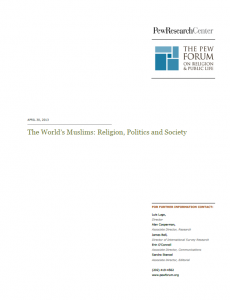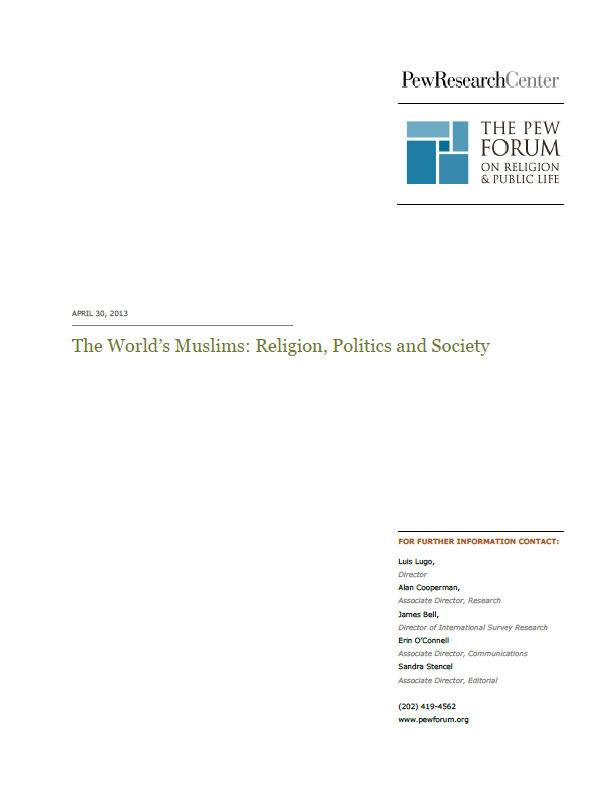 A new Pew Research Center survey of Muslims around the globe finds that most adherents of the world’s second-largest religion are deeply committed to their faith and want its teachings to shape not only their personal lives but also their societies and politics. In all but a handful of the 39 countries surveyed, a majority of Muslims say that Islam is the one true faith leading to eternal life in heaven and that belief in God is necessary to be a moral person. Many also think that their religious leaders should have at least some influence over political matters. And many express a desire for sharia – traditional Islamic law – to be recognized as the official law of their country.
A new Pew Research Center survey of Muslims around the globe finds that most adherents of the world’s second-largest religion are deeply committed to their faith and want its teachings to shape not only their personal lives but also their societies and politics. In all but a handful of the 39 countries surveyed, a majority of Muslims say that Islam is the one true faith leading to eternal life in heaven and that belief in God is necessary to be a moral person. Many also think that their religious leaders should have at least some influence over political matters. And many express a desire for sharia – traditional Islamic law – to be recognized as the official law of their country.
The survey – which involved more than 38,000 face-to-face interviews in 80-plus languages with Muslims across Europe, Asia, the Middle East and Africa – shows that Muslims tend to be most comfortable with using sharia in the domestic sphere, to settle family or property disputes. In most countries surveyed, there is considerably less support for severe punishments, such as cutting off the hands of thieves or executing people who convert from Islam to another faith. And even in the domestic sphere, Muslims differ widely on such questions as whether polygamy, divorce and family planning are morally acceptable and whether daughters should be able to receive the same inheritance as sons.
In most countries surveyed, majorities of Muslim women as well as men agree that a wife is always obliged to obey her husband. Indeed, more than nine-in-ten Muslims in Iraq (92%), Morocco (92%), Tunisia (93%), Indonesia (93%), Afghanistan (94%) and Malaysia (96%) express this view. At the same time, majorities in many countries surveyed say a woman should be able to decide for herself whether to wear a veil.
Overall, the survey finds that most Muslims see no inherent tension between being religiously devout and living in a modern society. Nor do they see any conflict between religion and science. Many favor democracy over authoritarian rule, believe that humans and other living things have evolved over time and say they personally enjoy Western movies, music and television – even though most think Western popular culture undermines public morality.
The new survey also allows some comparisons with prior Pew Research Center surveys of Muslims in the United States. Like most Muslims worldwide, U.S. Muslims generally express strong commitment to their faith and tend not to see an inherent conflict between being devout and living in a modern society. But American Muslims are much more likely than Muslims in other countries to have close friends who do not share their faith, and they are much more open to the idea that many religions – not only Islam – can lead to eternal life in heaven. At the same time, U.S. Muslims are less inclined than their co-religionists around the globe to believe in evolution; on this subject, they are closer to U.S. Christians.
Few U.S. Muslims voice support for suicide bombing or other forms of violence against civilians in the name of Islam; 81% say such acts are never justified, while fewer than one-in-ten say violence against civilians either is often justified (1%) or is sometimes justified (7%) to defend Islam. Around the world, most Muslims also reject suicide bombing and other attacks against civilians. However, substantial minorities in several countries say such acts of violence are at least sometimes justified, including 26% of Muslims in Bangladesh, 29% in Egypt, 39% in Afghanistan and 40% in the Palestinian territories.
worlds-muslims-religion-politics-society-full-report






